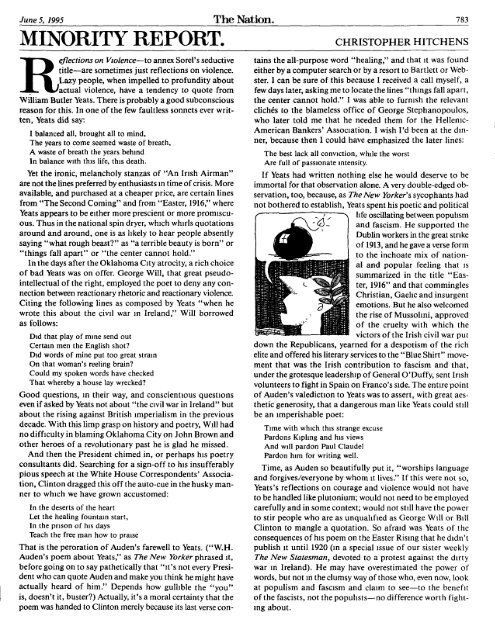The Nation. - Department of Government at Cornell University
The Nation. - Department of Government at Cornell University
The Nation. - Department of Government at Cornell University
You also want an ePaper? Increase the reach of your titles
YUMPU automatically turns print PDFs into web optimized ePapers that Google loves.
June 5.1995 <strong>The</strong> <strong>N<strong>at</strong>ion</strong>. 783MINORITY REPORT.CHRISTOPHER HITCHENSReflections on Vzolence-to annex Sorel’s seductive tains the all-purpose word “healing,” and th<strong>at</strong> it was foundtitle-are sometimes just reflections on violence. either by a computer search or by a resort to Bartlett or Web-Lazy people, when impelled to pr<strong>of</strong>undity about ster. I can be sure <strong>of</strong> this because I received a call myself, aactual violence, have a tendency to quote from few days l<strong>at</strong>er, asking me to loc<strong>at</strong>e the lines “things fall apart,William Butler Ye<strong>at</strong>s. <strong>The</strong>re is probably a good subconsciousreason for this. In one <strong>of</strong> the few faultless sonnets ever written,Ye<strong>at</strong>s did say:I balanced all, brought all to mind,<strong>The</strong> years to come seemed waste <strong>of</strong> bre<strong>at</strong>h,A waste <strong>of</strong> bre<strong>at</strong>h the years behlndIn balance wlth thls life, thls de<strong>at</strong>h.Yet the ironic, melancholy stanzas <strong>of</strong> “An Irlsh Airman”are nothe lines preferred by enthusiasts in time <strong>of</strong> crisis. Moreavailable, and purchased <strong>at</strong> a cheaper price, are certain linesfrom “<strong>The</strong> Second Coming” and from “Easter, 1916,” whereYe<strong>at</strong>s appears to be elther more prescient or more promiscuous.Thus in the n<strong>at</strong>ional spin dryer, which whirls quot<strong>at</strong>ionsaround and around, one is as likely to hear people absentlysaying “wh<strong>at</strong> rough beast?” as “a terrible beauty is born” or“things fall apart” or “the center cannot hold.”In the days after the Oklahoma City <strong>at</strong>rocity, a rich choice<strong>of</strong> bad Ye<strong>at</strong>s was on <strong>of</strong>fer. George Will, th<strong>at</strong> gre<strong>at</strong> pseudointellectual<strong>of</strong> the right, employed the poet to deny any connectionbetween reactionary rhetoric and reactionary violence.Citing the following lines as composed by Ye<strong>at</strong>s “when hewrote this about the civil war in Ireland,” Will borrowedas follows:Dld th<strong>at</strong> play <strong>of</strong> mine send outCertaln men the English shot?Dld words <strong>of</strong> mine put too gre<strong>at</strong> strainOn th<strong>at</strong> woman’s reeling brain?Could my spoken words have checkedTh<strong>at</strong> whereby a house lay wrecked?Good questions, in their way, and conscientious questionseven if asked by Ye<strong>at</strong>s not about “the civil war in Ireland” butabout the rising against British Imperialism in the previousdecade. With this limp grasp on history and poetry, Will hadno difficulty in blaming Oklahoma City on John Brown andother heroes <strong>of</strong> a revolutionary past he is glad he missed.And then the President chimed in, or perhaps his poetryconsultants did. Searching for a sign-<strong>of</strong>f to his insufferablypious speech <strong>at</strong> the White House Correspondents’ Associ<strong>at</strong>ion,Clinton dragged this <strong>of</strong>f the auto-cue in the husky mannerto which we have grown accustomed:In the deserts <strong>of</strong> the heartLet the healing fountam start,In the prison <strong>of</strong> hls daysTeach the free man how to pralseTh<strong>at</strong> is the peror<strong>at</strong>ion <strong>of</strong> Auden’s farewell to Ye<strong>at</strong>s. (“W.H.Auden’s poem about Ye<strong>at</strong>s,” as <strong>The</strong> New Yorker phrased It,before going on to say p<strong>at</strong>hetically th<strong>at</strong> “It’s not every Presidentwho can quote Auden and make you think he might haveactually heard <strong>of</strong> him.” Depends how gullible the “YOU”is, doesn’t it, buster?) Actually, it’s a moral certainty th<strong>at</strong> thepoem was handed to Clinton merely because its last verse con-the center cannot hold.” I was able to furnish the relevantclichCs to the blameless <strong>of</strong>fice <strong>of</strong> George Stephanopoulos,who l<strong>at</strong>er told me th<strong>at</strong> he needed them for the Hellenic-American Bankers’ Associ<strong>at</strong>ion. I wish I’d been <strong>at</strong> the dmner,because then I could have emphasized the l<strong>at</strong>er lines:<strong>The</strong> best lack all convlction, whde the worstAre full <strong>of</strong> passlon<strong>at</strong>e Intensity.If Ye<strong>at</strong>s had written nothing else he would deserve to beimmortal for th<strong>at</strong> observ<strong>at</strong>ion alone. A very double-edged observ<strong>at</strong>ion,too, because, as <strong>The</strong> New Yorker’s sycophants hadnot bothered to establish, Ye<strong>at</strong>s spent his poetic and politicalIf \ life oscill<strong>at</strong>ing between populismand fascism. He supported theDublin workers in the gre<strong>at</strong> strike<strong>of</strong> 1913, and he gave a verse formto the incho<strong>at</strong>e mix <strong>of</strong> n<strong>at</strong>ionaland popular feeling th<strong>at</strong> issummarized in the title “Easter,1916” and th<strong>at</strong> comminglesChristian, Gaelic and insurgentemotions. But he also welcomedthe rise <strong>of</strong> Mussollni, approved<strong>of</strong> the cruelty with which thevictors <strong>of</strong> the Irish civil war putdown the Republicans, yearned for a despotism <strong>of</strong> the richelite and <strong>of</strong>fered his literary services to the “Blue Shirt” rnovementth<strong>at</strong> was the Irish contribution to fascism and th<strong>at</strong>,under the grotesque leadership <strong>of</strong> General O’Duffy, sent Irishvolunteers to fight in Spain on Franco’s side. <strong>The</strong> entire point<strong>of</strong> Auden’s valediction to Ye<strong>at</strong>s was to assert, with gre<strong>at</strong> aestheticgenerosity, th<strong>at</strong> a dangerous man like Ye<strong>at</strong>s could stillbe an imperishable poet:Tlme with which thls strange excusePardons Klpllng and hls viewsAnd will pardon Paul Claude1Pardon him for writing well.Time, as Auden so beautifully put it, “worships languageand forgives/everyone by whom It lives.” If this were not so,Ye<strong>at</strong>s’s reflections on courage and violence would not haveto be handled like plutonium; would not need to be employedcarefully and in some context; would not still have the powerto stir people who are as unquallfled as George Will or B~llClinton to mangle a quot<strong>at</strong>ion. So afrald was Ye<strong>at</strong>s <strong>of</strong> theconsequences <strong>of</strong> his poem on the Easter Rising th<strong>at</strong> he didn’tpublish it until 1920 (in a special issue <strong>of</strong> our sister weekly<strong>The</strong> New St<strong>at</strong>esman, devoted to a protest against the dirtywar in Ireland). He may have overestim<strong>at</strong>ed the power <strong>of</strong>words, but not in the clumsy way <strong>of</strong> those who, even now, look<strong>at</strong> populism and fascism and claim to see-to the benefit<strong>of</strong> the fascists, not the popullsts-no difference worth fightingabout.













